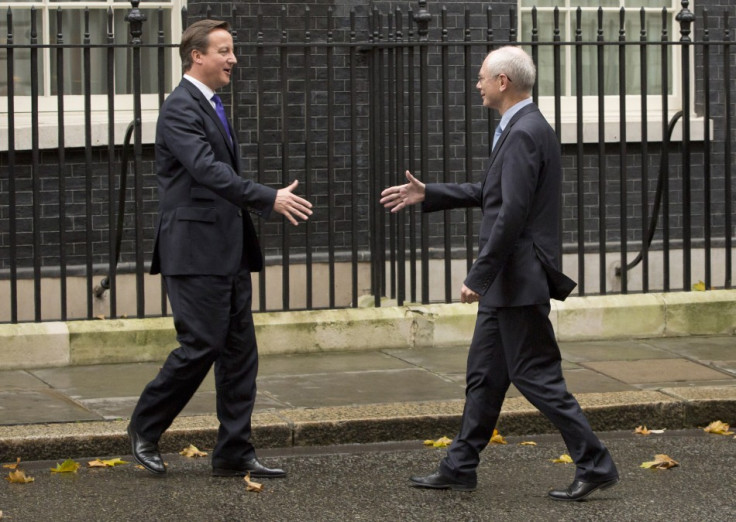UK Exits Recession: Out of the British Woods Through the European Trees

"One percent" has become a loaded term in modern politics and a figure which represents the unfairly-guarded privileges of the wealthy elite from the less-affluent masses.
Given the socioeconomic background of the Prime Minister and his Chancellor, there's a certain irony in the fact that a "1 percent" figure has sparked such a raging debate over the nation's economic recovery.
"We're on the right track," said both David Cameron and George Osborne after the Office for National Statistics reported the strongest quarterly growth figures in five years that hauled Britain out of recession and, together with record employment figures and tamer inflation, point to good times ahead.
"Underlying growth is weak," retorted the Shadow Chancellor, Ed Balls, along with a chorus of others who were all-too quick to note the ONS's broad caveats and one-time domestic boosters to the super-charged data: no Jubilee holiday impact, big lift from the Olympic Games.
Britain's economic fate is perhaps more closely linked to its politics than in any other nation outside of the Eurozone. The government's refusal to turn back on its fundamental strategy of public spending cuts and deficit reduction has fuelled a heated debate over the role of state support in a modern economy.
Oddly enough, the views expressed by the government (we're on the right track) is a harder to defend than the view of the opposition (underlying growth is weak) is to attack.
Underlying fundamentals are showing some real resilience to the broader headline malaise and the global economic slowdown. Say what you will about the data collection methods (many have) but the official figures is fairly conclusive; more Britons are working (nearly 30 million) than ever before, inflation is slowing (to a three-year low) and real incomes are starting to rise again.
"Crowding out" - the idea that government spending discourages private investment - is a controversial theory, but the government may be encouraged by signs that its public sector job cull may have energized a sustainable wave of private sector hiring.
As RBS economist Ross Walker notes, nearly 60 percent of the estimated 730,000 in civil service layoffs expected over five years have already happened. At the same time, private sector higher has more than offset that with 1.1 million new jobs.
The figures don't add up to prima facie case to support all of the government's austerity programmes, it does, at the very least, present some evidence of its success.
That said, it doesn't fully endorse the view that "we're on the right track" either, because at this stage - Britain is the first of the G7 nations to publish its growth estimate - it's impossible to know.
Wednesday's "data dump" from the Eurozone made for grim reading; Germany looks headed into recession, France is languishing amid steep unemployment and limp business investment and the region itself, hamstrung by the on-going sovereign debt crisis, is spiralling headlong into recession.
It shouldn't need to be said ... but this matters.
A lot.
Britain's economy is export driven and overseas sales make up a third of its growth. At present, four of its five of its biggest export markets, comprising two thirds of the total, are either flat-lining on in recession. Run your finger further down the list and you'll see names like Italy, Spain and Belgium before you get out of the top ten. They're all shrinking, too.
And it's worth noting that the one shining beacon in our export top ten - the United States - is itself starting to fizzle under as the sugar rush of its stimulus programme wears off and investors fret over the impact of the so-called fiscal cliff (automatic spending cuts and tax increases) that will kick-in on next year.
Put simply, if you're running a corner shop near an industrial estate where 7 of the 10 businesses are losing money, it doesn't take a great leap of imagination to conclude that your sales are going to decline. Investing more money in better shelves and sharper advertising isn't likely to change that much.
All you can do is get your business as ready as possible for the recovery.
In fact, the lull should provide you with the best excuse to stop, think and establish a longer-term strategy.
In the case of Britain, the chosen path is one that reduces the public sector contribution (and the long-running deficits it requires) in favour of private investment. And the tools are in place for it to work.
The Bank of England's quantitative easing efforts have reduced long-term interest rates and (broadly) anchored inflation expectations. The aim isn't simply to rebuild the health of the financial system but also to make safe-have investments less attractive and entice investors further out on the "risk curve".
Twinned with the balance sheet strength of British businesses - £750bn - the pair should create the conditions for swift investment-led growth when (if) the Eurozone economy finally gets its house in order.
It's a big if, of course, but there's very little to do in the interim. And given the miserable backdrop (we're looking at five actual or quasi sovereign rescues worth nearly half a trillions euros in Europe since 2010) it's truly amazing to think the economy is roughly the same size as it was last year (with more people working and earning more money).
As the ONS' chief economist, Joe Grice, succinctly put it: "We're out of recession, but not out of the woods".
Nor did we plant the trees.
© Copyright IBTimes 2025. All rights reserved.





















